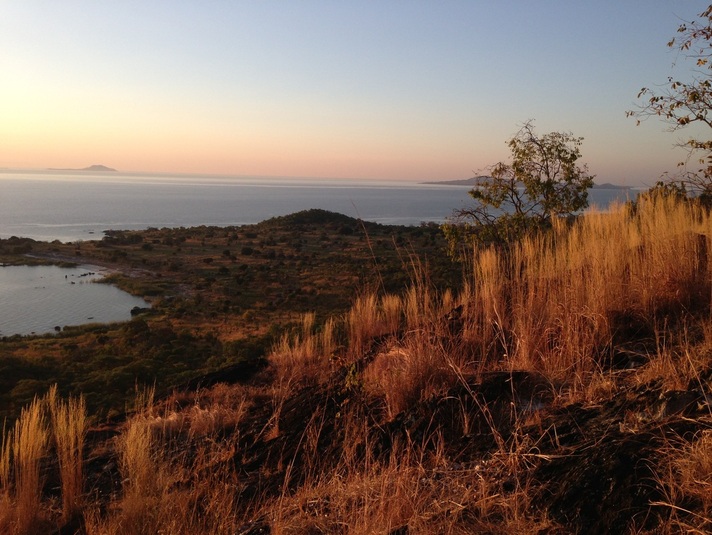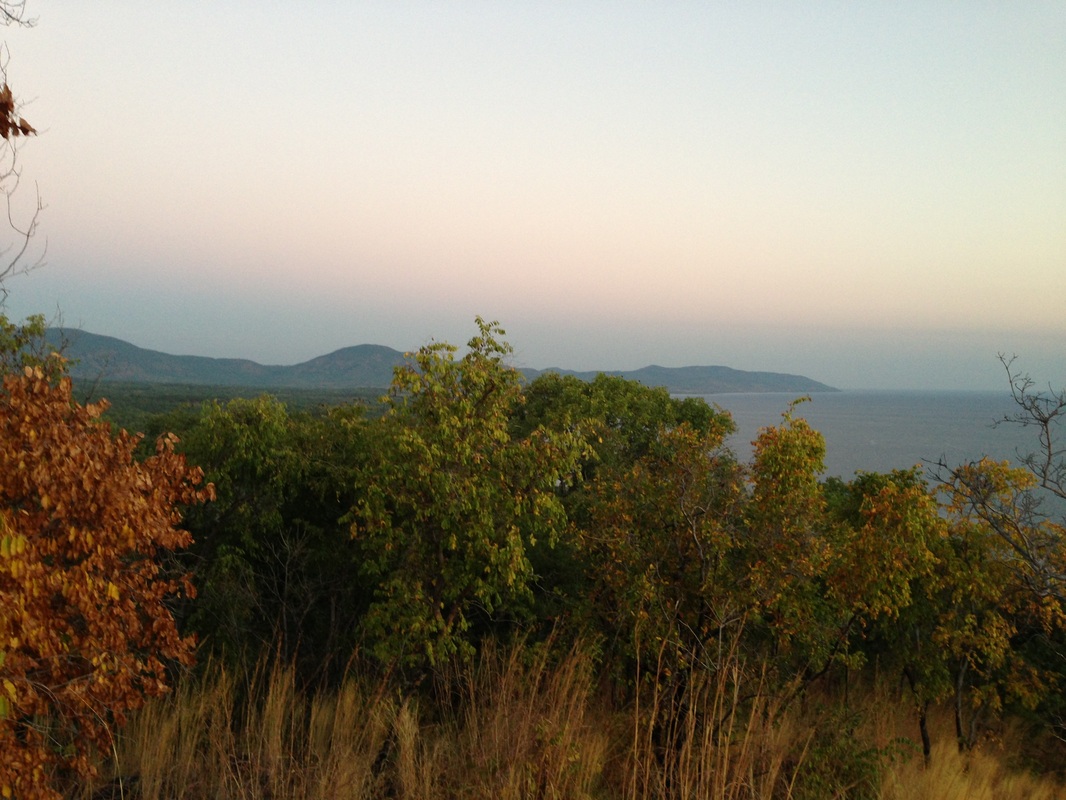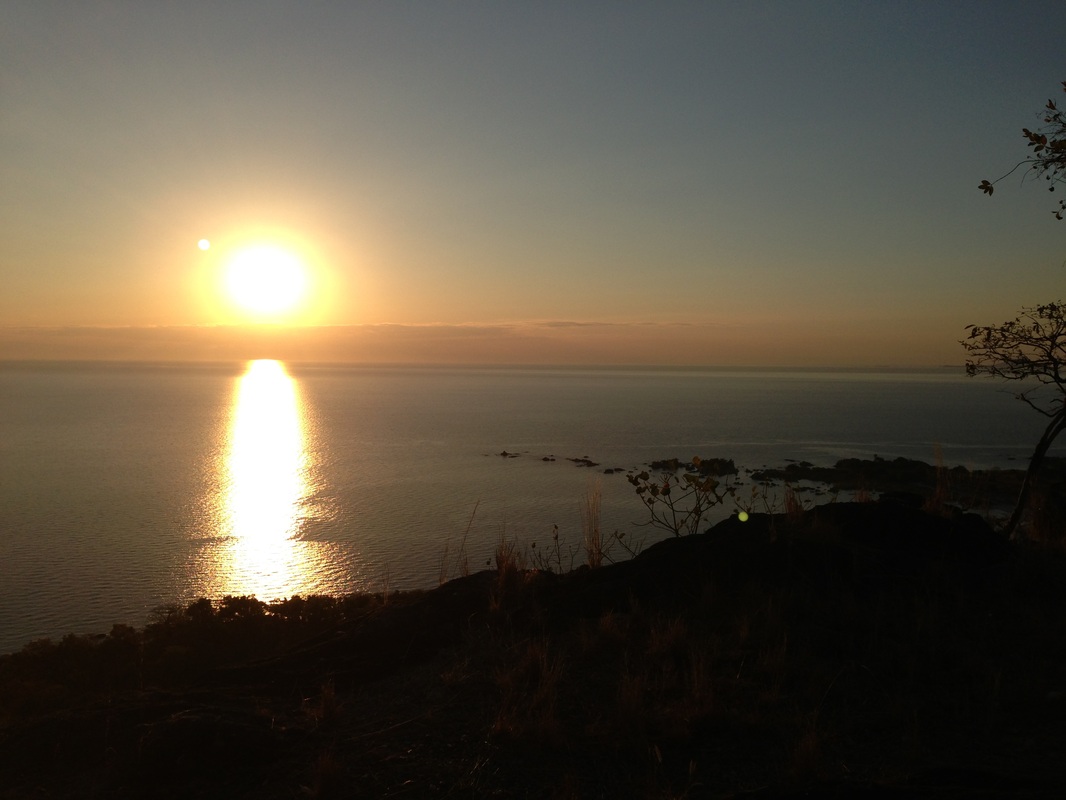 The view north towards Malawi from "Lookout Point," otherwise known as "The Place to Make Phone Calls." Mala village is spread out below, Chizimulu is far to the left and Likoma is barely visible behind the tree.
The view north towards Malawi from "Lookout Point," otherwise known as "The Place to Make Phone Calls." Mala village is spread out below, Chizimulu is far to the left and Likoma is barely visible behind the tree. JUNE 26: Power! Electric power and internet! Though it is true that the lodge office still needs its new batteries to be connected soon, it is also true that all the difficulties of the last two weeks were due in large part to two crossed wires. How anyone figured this out I don’t know, since we were out on the trail; but now I can transfer my videos and audios and work on notation when I am at the lodge as I had always hoped. Victory! As I was eating lunch, I let all my videos from this previous trip load into my laptop. Then I edited them and backed them up on my external hard drive. I transcribed one piece into music notation. All of this I could not have done in one day before this, let alone half a day.
There was hot water for the shower this morning. The night watchmen must light a fire at five in the morning under a barrel boiler encased in the local mud-cement. Then by six, those of us in Volunteer Village have enough hot water to take hot showers; but only when the night watchmen are not busy with other duties. When guests are here, they must light these fires for each individual guest chalet plus our little “village” (four huts) and the other little “village” (three houses). I am happy to say they have been able to provide us with hot water now for several days running.
Breakfast was a roll and coffee, and we had fresh water to drink, too. Lunch had a green salad and even had sprouts, plus spaghetti and sauce, a frequent lunch entrée when there are no guests at the lodge. We had passion-fruit cake and fresh papaya for dessert!
Guests arrived later in the day. We volunteers often join them for sundowner drinks; it give us an opportunity to meet some different people and share news of what we do here. Today, they boated us all out to Rock Island, which is exactly what it says it is: a giant, dramatic rock out in the lake, with a flat space for pillows and a picnic to be spread out. In fact, I learned the lodge can set up a bed, toilet and shower on the island for honeymooners! It was a fantastic place to watch the sunset, but I did feel bad for the boatman and server who had to go early to set up, head back, pick us up, then stand around the entire time we were there just to wait for us to have enough and head back. As we were getting back in the boat, I told them each to get something on me when their shifts were over.
Dinner at Volunteer Beach was very pleasant. Lily and Ines are not back yet, but we got a nice fire started and had rice and green beans. Because of my food allergies, I could not have the entrée, so they made an omelette just for me!
I came back to my hut to see that it had been thoroughly swept and my laundry taken! All in all, this was a day when I felt very taken care of. It was very easy to fall asleep, but in a different way than when out in the villages.
JUNE 28: Yesterday was our anniversary. I have told people that I have to climb a mountain to make a phone call. Maybe they think I am being figurative or exaggerating, so I decided to put some pictures I took just before making my anniversary phone call to prove it! One literally has to stand on a cliff, looking for the place where the reception bars will light up. But as you will see, it is hardly a difficult chore when the view looks like this!
There was hot water for the shower this morning. The night watchmen must light a fire at five in the morning under a barrel boiler encased in the local mud-cement. Then by six, those of us in Volunteer Village have enough hot water to take hot showers; but only when the night watchmen are not busy with other duties. When guests are here, they must light these fires for each individual guest chalet plus our little “village” (four huts) and the other little “village” (three houses). I am happy to say they have been able to provide us with hot water now for several days running.
Breakfast was a roll and coffee, and we had fresh water to drink, too. Lunch had a green salad and even had sprouts, plus spaghetti and sauce, a frequent lunch entrée when there are no guests at the lodge. We had passion-fruit cake and fresh papaya for dessert!
Guests arrived later in the day. We volunteers often join them for sundowner drinks; it give us an opportunity to meet some different people and share news of what we do here. Today, they boated us all out to Rock Island, which is exactly what it says it is: a giant, dramatic rock out in the lake, with a flat space for pillows and a picnic to be spread out. In fact, I learned the lodge can set up a bed, toilet and shower on the island for honeymooners! It was a fantastic place to watch the sunset, but I did feel bad for the boatman and server who had to go early to set up, head back, pick us up, then stand around the entire time we were there just to wait for us to have enough and head back. As we were getting back in the boat, I told them each to get something on me when their shifts were over.
Dinner at Volunteer Beach was very pleasant. Lily and Ines are not back yet, but we got a nice fire started and had rice and green beans. Because of my food allergies, I could not have the entrée, so they made an omelette just for me!
I came back to my hut to see that it had been thoroughly swept and my laundry taken! All in all, this was a day when I felt very taken care of. It was very easy to fall asleep, but in a different way than when out in the villages.
JUNE 28: Yesterday was our anniversary. I have told people that I have to climb a mountain to make a phone call. Maybe they think I am being figurative or exaggerating, so I decided to put some pictures I took just before making my anniversary phone call to prove it! One literally has to stand on a cliff, looking for the place where the reception bars will light up. But as you will see, it is hardly a difficult chore when the view looks like this!
Lily arrived at Nkwichi at four this morning. She had had to wait until nighttime to release the fingerlings at the Fish Farm in Litanda, and the committee had had some disagreement about how and where to release them. Committee meetings can be very long here – even at midnight! Eventually, all was resolved, the fish were properly released and Lily and Ines were back on their way. Ines stayed in Cobué because she must do a visa run to Likoma.
Naturally I did not see Lily until the afternoon. Her news was that, unlike past years, Luiga and Chissindo, those distant mountains in the previous pictures, do in fact have choirs! She had checked with the president of Luiga’s Umoji Association on her way through, and he had confirmed that they did in fact have a choir, and Chissindo did as well.
This was a bit of a shock, since all the other villages had told us that these two villages did not have choirs. We had always been scheduled to leave for Luiga and Chissindo on the 29th, but I had half given up on the idea that we would actually go. Now not only were we going, we were supposed to leave tomorrow!
Joe was still recovering from his illness, though, and was not at work. This meant we would need to leave on the 30th. This was a good thing; I had some research to do! These two villages are quite a bit further inland and have entirely different cultures. Chissindo is primarily Yao, and they practice a form of folk Islam, which makes them highly unlikely to participate in choirs. Luiga is apparently half Nyanja and half Yao. I plan to spend tomorrow doing some research on the Yao people and their customs as well as trying to learn a bit more about these villages. I brought extra choral pieces with me in case I did need to form a new choir out of whole cloth, so I will bring those along.
There is no way around it: this trip will involve a much longer chapa ride than the first one I took. From there, we will hike seven hours to get to Chissindo, spend two more days there working with this new choir, then take a day to hike back to Luiga, work two days there, then take the chapa back to Cobué and the boat back to Nkwichi. Because of the extended chapa ride, I am going to need to leave all my recording equipment and solar backpack at the lodge to avoid the damage that is almost guaranteed to befall them if I bring them. I fully charge my phone and power it down, only to be used in emergencies and for recording and picture-taking.
JUNE 29: Today I tried to do as much research as I could on Chissindo and the Yao people. There is precious little information online: I found one Islamic site that gave the proper times for all prayers when one is in Chissindo, and I found some Christian missionary websites that explained how “the glory of the message of Jesus Christ has yet to reach these people.” I did find a little on the Yao language – enough to know that there are some similarities but also big differences. Nyanja will not get me by with someone who speaks Yao.
I am having difficulty at the lodge explaining why it is so important that I do this research. I based my music and plans upon one culture, but I am traveling to an area where this is not the primary culture. I included religious songs because church and state and daily life are not separate here; they are all inextricably intertwined. Now I would go to a primarily Muslim community and teach American spirituals about Jesus? I hear “anything you teach them they will be grateful for,” which may even be true, but that would not make my taking that assumption for granted ethical. Teaching people something when they don’t know what they are learning, that advocates something to which they are opposed, is certainly inappropriate at best.
In the middle of the afternoon, Mr. Elias comes to talk about Chissindo, which was his home village before he moved to Mala to work at Nkwichi. He tells us that there are churches in both villages and that Nyanja is spoken in addition to Yao. This was contrary to all reports we had received before, which is why one should always go as close to the source as possible. Once I learned this, I knew what I would be doing and working on when in these villages. Lily asks Elias if he would be willing to accompany us on the journey. Since this is a rare opportunity for him to get an all-expenses paid visit to his home area, he readily agrees.
Because of the travel and the new culture, this trip always loomed as a large challenge on my schedule that I was not sure I was ready for. Now that I know I am going and have a better idea of what I will be doing, I am actually starting to look forward to it.
Naturally I did not see Lily until the afternoon. Her news was that, unlike past years, Luiga and Chissindo, those distant mountains in the previous pictures, do in fact have choirs! She had checked with the president of Luiga’s Umoji Association on her way through, and he had confirmed that they did in fact have a choir, and Chissindo did as well.
This was a bit of a shock, since all the other villages had told us that these two villages did not have choirs. We had always been scheduled to leave for Luiga and Chissindo on the 29th, but I had half given up on the idea that we would actually go. Now not only were we going, we were supposed to leave tomorrow!
Joe was still recovering from his illness, though, and was not at work. This meant we would need to leave on the 30th. This was a good thing; I had some research to do! These two villages are quite a bit further inland and have entirely different cultures. Chissindo is primarily Yao, and they practice a form of folk Islam, which makes them highly unlikely to participate in choirs. Luiga is apparently half Nyanja and half Yao. I plan to spend tomorrow doing some research on the Yao people and their customs as well as trying to learn a bit more about these villages. I brought extra choral pieces with me in case I did need to form a new choir out of whole cloth, so I will bring those along.
There is no way around it: this trip will involve a much longer chapa ride than the first one I took. From there, we will hike seven hours to get to Chissindo, spend two more days there working with this new choir, then take a day to hike back to Luiga, work two days there, then take the chapa back to Cobué and the boat back to Nkwichi. Because of the extended chapa ride, I am going to need to leave all my recording equipment and solar backpack at the lodge to avoid the damage that is almost guaranteed to befall them if I bring them. I fully charge my phone and power it down, only to be used in emergencies and for recording and picture-taking.
JUNE 29: Today I tried to do as much research as I could on Chissindo and the Yao people. There is precious little information online: I found one Islamic site that gave the proper times for all prayers when one is in Chissindo, and I found some Christian missionary websites that explained how “the glory of the message of Jesus Christ has yet to reach these people.” I did find a little on the Yao language – enough to know that there are some similarities but also big differences. Nyanja will not get me by with someone who speaks Yao.
I am having difficulty at the lodge explaining why it is so important that I do this research. I based my music and plans upon one culture, but I am traveling to an area where this is not the primary culture. I included religious songs because church and state and daily life are not separate here; they are all inextricably intertwined. Now I would go to a primarily Muslim community and teach American spirituals about Jesus? I hear “anything you teach them they will be grateful for,” which may even be true, but that would not make my taking that assumption for granted ethical. Teaching people something when they don’t know what they are learning, that advocates something to which they are opposed, is certainly inappropriate at best.
In the middle of the afternoon, Mr. Elias comes to talk about Chissindo, which was his home village before he moved to Mala to work at Nkwichi. He tells us that there are churches in both villages and that Nyanja is spoken in addition to Yao. This was contrary to all reports we had received before, which is why one should always go as close to the source as possible. Once I learned this, I knew what I would be doing and working on when in these villages. Lily asks Elias if he would be willing to accompany us on the journey. Since this is a rare opportunity for him to get an all-expenses paid visit to his home area, he readily agrees.
Because of the travel and the new culture, this trip always loomed as a large challenge on my schedule that I was not sure I was ready for. Now that I know I am going and have a better idea of what I will be doing, I am actually starting to look forward to it.


 RSS Feed
RSS Feed